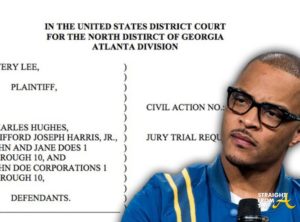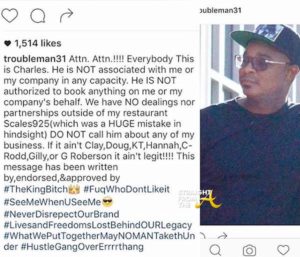Clifford “T.I.” Harris is still battling legal issues surrounding a failed Atlanta restaurant venture.
T.I.’s ‘Scales 925’ restaurant was closed just last year following a number of lawsuits being filed against the business.
[FLASHBACK: T.I. & Business Partner Sued By Several Former Scales 925 Employees… ]
The rapper faces yet another battle as he’s now being accused of paying himself an excessive salary from the restaurant and diverting business funds for personal use, even though he allegedly knew his decision would cause his employees to lose out on receiving their owed wages and overtime.
Details below…
 Radar Online reports that Avery Lee, a former Scales 925 employee, originally filed suit against T.I., also known as Clifford Joseph Harris Jr., and the musician?s business partner, Charles Hughes, back in November 2015 seeking payment for his wages and overtime hours.
Radar Online reports that Avery Lee, a former Scales 925 employee, originally filed suit against T.I., also known as Clifford Joseph Harris Jr., and the musician?s business partner, Charles Hughes, back in November 2015 seeking payment for his wages and overtime hours.
In the suit, Lee accused his former bosses of “willfully and knowingly” failing to fully compensate him for his wages and overtime hours.
Lee was subsequently awarded a default judgment of $27,486, plus $7,000 in attorney fees, against Scales 925 but he never received collected payment on the judgement because the business eventually closed after being served an eviction notice last year.
For the record, Tip publicly separated himself from the drama by denouncing his business partner online.
In Lee’s new complaint, filed at the end of May, he’s now suing T.I. and wants to hold him personally liable for the $34,000 that he is still owed.
The suit claims Hughes used the Scales 925 bank account as his own, and, at the same time, skipped out on paying workers.
Lee also alleges that even T.I. continued to pay himself and take profits despite the dire financial condition the business was in at the time
As previously reported, the restaurant eventually was closed in 2016 following a number of other lawsuits being filed against the business.
Lee’s suit blames the actions of the owners for Scales demise and in legal documents, claims that the co-owners could have decided not to draw an excessive salary when Scales was losing money and he says they failed to pursue a less expensive rental space, which could have saved money.
The extravagant expenditures by Hughes and Harris in up-fitting the premises for Scales, and upon information and belief, Hughes and Harris in paying for their own personal luxuries with corporate funds and continuing to pay themselves unreasonably high salary, while concealing the insolvency of Scales, drove Scales to financial ruin.
He also alleges that T.I. committed fraud and he is demanding the court hold him personally liable for the $34,000 judgment since the former employee can?t collect on the money from Scales 925 LLC due to the fact that the business was dissolved.
![Straight From The A [SFTA] – Atlanta Entertainment Industry Gossip & News - Atlanta's Most Reliable Source of Entertainment Gossip!](https://straightfromthea.com/wp-content/uploads/2015/04/sftalogo31.png)
















